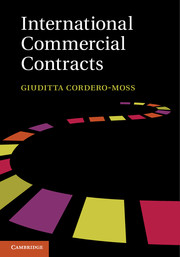Book contents
- Frontmatter
- Contents
- Preface
- Introduction
- 1 Contract practice and its expectations in terms of the governing law
- 2 The role of transnational law
- 3 The impact of the governing law
- 4 Which state law governs an international contract?
- 5 Does arbitration ensure a self-sufficient contract?
- 6 Conclusion
- Bibliography
- Index
6 - Conclusion
Published online by Cambridge University Press: 05 June 2014
- Frontmatter
- Contents
- Preface
- Introduction
- 1 Contract practice and its expectations in terms of the governing law
- 2 The role of transnational law
- 3 The impact of the governing law
- 4 Which state law governs an international contract?
- 5 Does arbitration ensure a self-sufficient contract?
- 6 Conclusion
- Bibliography
- Index
Summary
The excursus made in this book was meant to determine the relationship between an international contract and the sources that regulate it. Even if the parties have not thought of any governing law when they drafted the contract, even if they have expressly intended to avoid a certain governing law, even if they have chosen a certain set of transnational rules to govern their transaction, even if they have made use of model contracts that are meant to be used in a variety of jurisdictions – the contract may nevertheless be subject to the mandatory rules, the overriding mandatory rules or the ordre public of state laws that the parties had not taken into consideration or had intended to avoid. Moreover, the contract will be interpreted on the basis of the legal tradition of the applicable law, thus attaching different legal effects to the same wording, depending on the applicable law.
What I have tried to show is that an international contract is not necessarily a phenomenon sui generis, responding to its own logic, and that has to be written and interpreted in a completely different way from a domestic contract. It is, admittedly, a widespread habit to adopt a different style when the contract is international and to draft in accordance with English/US contract models; but this may create more problems than it solves, particularly in connection with the interaction between a common law contract style and a civil law governing law. The practice of writing contracts so that they are supposedly self-sufficient is often the result of a cost–benefit analysis leading to the conscious assumption of the risk that the contract may not be interpreted or applied exclusively on the basis of its terms. The analysis may have shown that it would take more resources to adapt a standardised contract model to the requirements of the local law, than legal proceedings and a possible invalidity or unenforceability of the contract might cost. Sometimes, the practice of writing self-sufficient contracts may be the result of insufficient awareness of the legal framework by the drafters. In either case, there does not seem to be a basis for elevating this practice to a source of law and thus considering the contracts as actually self-sufficient.
- Type
- Chapter
- Information
- International Commercial ContractsApplicable Sources and Enforceability, pp. 308 - 309Publisher: Cambridge University PressPrint publication year: 2014



